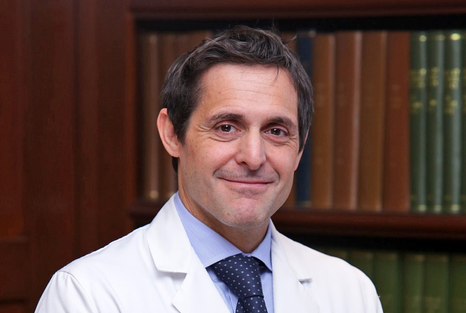For Dr. Mario Gaudino, being an excellent cardiothoracic surgeon and conducting clinical research to find new ways to improve patients’ outcomes have been two sides of the same coin since he was a medical student in Rome. Today, he is a renowned surgeon treating patients with heart and cardiovascular disease, and at the same time, serves as the primary investigator of the ROMA Trial, an international, randomized controlled trial that aims to determine the best strategy for coronary artery bypass surgery.
As the newly appointed director of the Joint Clinical Trials Office (JCTO) at Weill Cornell Medicine and NewYork-Presbyterian, Dr. Gaudino will oversee ongoing clinical trials and lead strategic planning efforts. He will focus on increasing the number of active clinical trials available to Weill Cornell Medicine patients, which currently stands at about 400, with just over 200 studies for patients with cancer and just under 200 for patients with other diseases. Dr. Gaudino, who is also the Stephen and Suzanne Weiss Professor in Cardiothoracic Surgery at Weill Cornell Medicine and a cardiothoracic surgeon at NewYork-Presbyterian/Weill Cornell Medical Center, will also encourage more physicians to get involved in clinical research and strengthen the JCTO’s existing infrastructure and services that support investigators across the two institutions.
We spoke with Dr. Gaudino about his new role and vision for the JCTO.
How did you become interested in working on clinical research?
At my alma mater in Rome, I learned that clinical research is part of a clinician’s essential activities. My mentors said many times that something relevant to clinical research happens every day in a busy clinical practice and that if you don’t think that’s true, you’re not paying close enough attention. Physicians who also conduct research can improve knowledge, advance the field and provide benefits to more patients than is possible through clinical care alone.
What attracted you to the role of director of the JCTO?
Since I joined Weill Cornell Medicine, the JCTO and the Clinical & Translational Science Center have provided me with extraordinary support for my own clinical research. My new role as director of the JCTO is my chance to give back to the institution. I’m honored to follow in the footsteps of my predecessor, Dr. John Leonard.
What does the JCTO do, and why is it so important for advancing clinical research?
As a centralized administrative office, the JCTO provides foundational support for designing, initiating and conducting clinical trials for a range of diseases other than cancer. For these trials, we facilitate recruiting patient volunteers, regulatory compliance, safety and ethics reviews, and contracts with industry and government partners.
We also offer assistance for cancer trials that fall under the leadership of Dr. Giuseppe Giaccone, the associate director for clinical research at the Sandra and Edward Meyer Cancer Center and a professor of medicine at Weill Cornell Medicine.
How does the JCTO benefit investigators?
The JCTO helps investigators with important scientific questions by providing assistance in designing and initiating trials and connecting them with patients who generously agree to volunteer as study participants. By facilitating and streamlining administrative tasks, the JCTO helps investigators across the institution launch and conduct more clinical studies.
How does the JCTO benefit patients and families?
Through the JCTO, patients can learn about available clinical trials at Weill Cornell Medicine, NewYork-Presbyterian/Weill Cornell Medical Center and across our institutional network in Manhattan, Brooklyn and Queens. Patients volunteer to participate — hopefully to improve their own health but also to advance the field.
What is your vision for further growing the number of trials and enhancing the existing infrastructure of the JCTO?
In my new role, I will work to increase awareness among clinicians about the importance of conducting clinical research in addition to their everyday clinical activity. The JCTO is here to support them to make that possible. We will also increase our communications efforts with patients to raise awareness of clinical trial options for potential new treatments and therapeutic approaches.
I’m looking forward to collaborating closely with Dr. Rainu Kaushal, senior associate dean for clinical research and chair of the Department of Population Health Sciences at Weill Cornell Medicine and physician-in-chief of population health sciences at NewYork-Presbyterian/Weill Cornell Medical Center to create a blueprint for growing our clinical trials portfolio.
Is there a noteworthy recent effort by the JCTO that illustrates the potential for clinical research to make a difference?
The JCTO quickly activated five COVID-19 trials — on very short timelines — in response to the urgent need for new treatment options for patients, including participating in the Moderna COVID-19 vaccine trial. We have just opened another vaccine trial and are participating in a randomized controlled trial for convalescent plasma. The JCTO has facilitated several observational studies investigating the long-term side effects of COVID-19, which are set to open soon. We are also assisting faculty with the NYP-WELCOME study, which is recruiting asymptomatic healthcare workers at our institutions to contribute biological samples so our investigators can conduct basic, translational and clinical research into the natural history of COVID-19.
In addition to your research and your new role as JCTO director, you are also a teacher and mentor. Why is it important to nurture talent in the next generation of students and junior faculty?
Clinical medicine and research go hand in hand. Physicians who have not been exposed to clinical research during medical school, residencies or fellowships need to know they can be both outstanding doctors and outstanding clinical researchers, especially with the support of the JCTO. Students and junior faculty members will be the next generation of investigators, building on today’s scientific advances to benefit more patients in the future.

